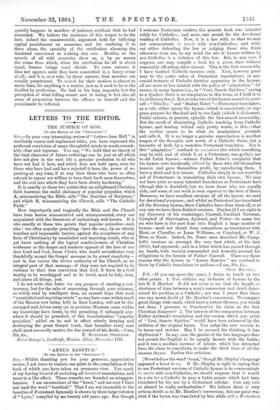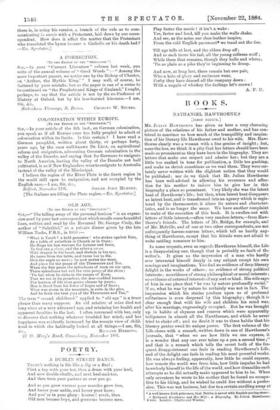" ANNUS SANCTUS."
TO THE EDITOR OF THE "SPECTATOR.")
SIR,—Whilst thanking you for your generous, appreciative review, I ask leave to explain one point in the compilation of the book of which you have taken an erroneous view. You speak of my having boasted of excluding all heretical translations, and more to a like effect. These remarks are founded on misappre- hension. I am unconscious of the "boast," and am sure I have not used the word "heretical." That I am not insensible to the beauties of Protestant hymnody is shown by three large volumes of " Lyrm," compiled by me twenty odd years ago. But though I welcome Protestant readers, the present book was intended solely for Catholics ; and more, was meant for the devotional reading of Catholics. Now, it is a law with us that we may not communicate in sacris with non-Catholics ; and with- out either defending the law or judging those who think otherwise from me, to my mind the use of hymns written by non Catholics is a violation of this law. But, in any case, I suppose, one may compile a book for a given class without reasonably offending other classes. This is the first reason why I have inserted Catholic versions only. Next, however great may be the poetic value of Protestant translations, in any crucial instance of Catholic doctrine appearing in the hymns, all are more or less tainted with the policy of "adaptation." Of course, in many hymns (e.g., in " Veni, Sancte Spiritus," saving to a Quaker) there is no temptation to this form, as I hold it to be, of literary fraud. But, to take two of the hymns named by your- self —" Dies Irw " and " Stabat Mater "—Protestant translators, as a rule, either ignore the hymns (which is consistent), or sup. press prayers for the dead and to our Lady (which is dishonest). Public opinion, at present, upholds the last-named immorality. But the result of eliminating Catholic teaching from Catholic hymns, and leaving behind only pretty words, is this,—that the residue ceases to be what its manipulator pretends and calls it. It is no longer a genuine reproduction in another tongue of the thoughts and words of a Catholic Saint, but a travestie of both by a nameless Protestant translator. Nor is this " adaptation " confined to omissions (for which something may be said, and of which I, as a Protestant, was guilty), nor to old Latin hymns,—witness Father Faber's complaint that his hymns were heretically altered by those who did themselves honour, and gave themselves profit, by reproducing them. I have a third and last reason. Catholics simply do not want the aid of Protestants in translating their own hymns. We may not have quite so many talented translators as Protestants have (though this is doubtful), but we have those who are equally able, and some of our work is even superior to the best of theirs. Moreover, we have excellent versions of all the hymns we need for devotional purposes ; and whilst no Protestant has translated all the Breviary hymns, three Catholics have done them all, or at any rate we have three distinct versions. Dryden (if I am right in my discovery of his renderings), Caswell, Cardinal Newman, Campbell of Skerrington, Aylward, and Potter—to name but six who have in the past done into English a large number of hymns—need not shrink from comparison as translators with Mant, or Chandler, or Isaac Williams, or Copeland, or W. J. Blew, or Neale. Indeed, Dr. Neale once described Mr. Camp- bell's versions as amongst the very best which, at his date (1850), had appeared ; and in a letter which has passed through my hands, both warmly commended and honestly avowed his obligations to the hymns of Father Caswell. These are three reasons why the hymns in " Annus Sanctus" are confined to those by Catholic translators or authors.—I am, Sir, &c., ORIF1Y SHIPLEY.
P.S.—If you can spare the space, I desire to touch on two other points. 1. You criticise my inclusion of hymns by the late R. S. Hawker. It did not occur to me that the length or shortness of time between a man's conversion and death deter- mined his position as a Catholic ; nor was I aware that there was any moral doubt of Mr. Hawker's conversion. To compare great things with small, which have a certain likeness, you would not deny, I presume, to Constantine his claim as the first Christian Emperor ? 2. The interest of the comparison between Father Aylward's translation and the version which you print of " Veni, Sancte Spiritus" would have been enhanced by the addition of the original hymn. You judge the new version to be terser and stricter. May I be excused for thinking it less
rhythmical? In any case, the genius of the two languages does not permit the English to be equally laconic with the Latin ;
and it was a needless increase of labour, which has detracted from the claim to exactitude, to make the third lines of all the stanzas rhyme. Pardon this criticism.
[Wewithdraw the word "boast," though Mr. Shipley's language appeared a boast to us. If Mr. Shipley is right in saying that to use Protestant versions of Catholic hymns is to communicate in sacris with non-Catholics, we should suppose that it would be a sin for a Catholic to pray a Latin prayer which had been translated for his use by a Protestant scholar. Can any rule so absurd be really authoritative ? We believe there is very serious doubt as to Mr. Hawker's conversion; but our point was that if the hymn was translated by him while still a Protestant, there is, in using his version, a breach of the rule as to com- municating in sacris with a Protestant, laid down by our corre- spondent. How does it affect the matter that the Protestant who translated the hymn became a Catholic on his deathbed P —En. Spectator.]



































 Previous page
Previous page